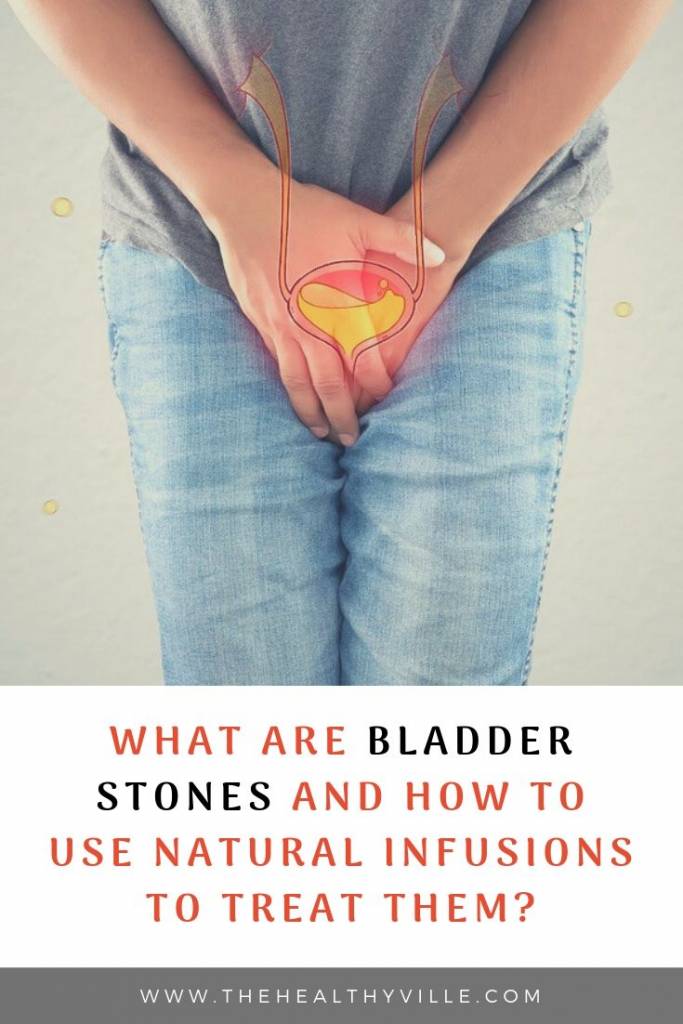What are bladder stones really? How can we notice that we have them, and how to treat them naturally? Inform yourself for better health care.
Bladder stones can cause pain and changes in urination habits. Fortunately, there are 4 infusions that help speed up your recovery.
What are bladder stones?
Bladder stones are due to an accumulation of substances such as oxalates or uric acid. These, in turn, tend to form after the crystallization of particles from too concentrated urine.
They are less frequent than kidney stones but can be quite annoying. Therefore, as a first line of treatment, it is essential to increase water consumption and modify dietary habits.
In addition, we cannot forget the importance that some medicinal plants have traditionally had in the treatment and prevention of this problem.
But first, now that you know what are bladder stones, you should know how do they accumulate and how to recognize them.
Why do stones accumulate in the bladder?
An incomplete emptying of the bladder can lead to the formation of stones in it. In turn, this is associated with diseases of the urinary system.
The main reason for the accumulation of these small stones in the bladder is due to an incomplete emptying of the same at the time of urination.
This occurs when there are conditions in the urinary system that alter the ability of the bladder to store urine. These conditions can be:
Benign prostatic hyperplasia: very common in elderly men. Due to the enlargement of the prostate, obstruction may occur in the exit of urine from the bladder.
Renal calculus: the stones in the kidneys could descend through the ureters to the bladder and accumulate there if they are not eliminated or dissolved.
Infection of the urinary tract: UTI can lead to inflammation of the bladder and consequently to difficulty in urination.
Neurogenic bladder: occurs when the nerves that carry information from the brain to the muscles of the bladder are damaged as a result of a neurological disease or injury.
Use of bladder catheters.
How do I know if I have bladder stones?
Sometimes bladder lithiasis can be asymptomatic because the stones do not block the normal flow of urine, being only detectable by imaging tests.
However, when there is blockage or the calculus is irritating the wall of the bladder, the following symptoms may appear:
- Sudden pain in the lower abdomen.
- Hematuria or blood in urine.
- Need to urinate constantly.
- Problems or inability to urinate.
- Burning or stinging sensation when urinating.
- Fever may appear, in case there is an infectious process.
In addition, the formation of calculus is usually quite related to lifestyle and eating habits.
The low intake of liquids, a diet low in fiber and very rich in salt, proteins and oxalates (mineral salts present in certain vegetables such as spinach) are clear predisposing factors for bladder lithiasis.
Although most of the time, the stones are removed spontaneously in the urine, there are more serious cases that require surgical intervention.
This is because the stones are deposited in the urinary tract, compromising the proper functioning of the same and causing intense pain. Therefore, a preventive treatment in order to avoid new episodes is essential.
Infusions to dissolve the stones in the bladder
As we have already mentioned, following a balanced diet and increasing water consumption are two important measures to avoid the formation of stones.
But in addition to these healthy measures, herbal medicine plays a crucial role both in the prevention and treatment of mild bladder lithiasis. We give you some options below.
The infusion of dandelion is one of the herbal remedies that help the treatment of bladder stones. However, there are also other options.
-
Infusion of bearberry
The bearberry leaf owes its action to its majority component: the arbutósido, a compound of phenolic nature that has traditionally been used in the treatment of urinary infections and urolithiasis, either alone or in combination with other diuretic action plants.
For the infusion put 1.5-4 g of dried leaf in 150 ml of water, 2-3 times a day.
-
Infusion of Java tea
It is a plant native to Indonesia with a strong diuretic action indicated in the treatment and prevention of urolithiasis. Due to its high content of potassium salts, it acts by increasing the volume of excreted urine.
For the infusion, put 2-3 g of Java leaf tea in 150 ml of water. Take 2 to 3 infusions a day.
-
Infusion of dandelion
In this case, you use the whole plant, including its root, which is rich in fructose and inulin. The leaf has high concentrations of potassium, terpenes and phenolic compounds.
All these components give it a powerful diuretic action. Dandelion is indicated in the adjuvant treatment of bladder stones.
For the infusion you can use 4-10 g of leaf or root, up to 3 infusions a day.
-
Infusion of horsetail or horsetail
It is great in the treatment of mild lithiasic processes due to its diuretic and remineralizing properties. Increases the volume of urine excreted and favors the washing of the urinary tract.
You put 2-3 g of horsetail in 250 ml of water.
Don’t forget to SHARE what are bladder stones and how to treat them with your friends and family on your social networks!

